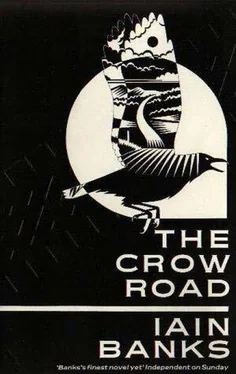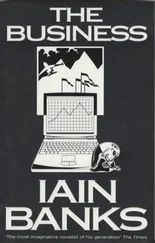Iain Banks - The Crow Road
Здесь есть возможность читать онлайн «Iain Banks - The Crow Road» весь текст электронной книги совершенно бесплатно (целиком полную версию без сокращений). В некоторых случаях можно слушать аудио, скачать через торрент в формате fb2 и присутствует краткое содержание. Год выпуска: 1992, Жанр: Современная проза, на английском языке. Описание произведения, (предисловие) а так же отзывы посетителей доступны на портале библиотеки ЛибКат.
- Название:The Crow Road
- Автор:
- Жанр:
- Год:1992
- ISBN:нет данных
- Рейтинг книги:5 / 5. Голосов: 1
-
Избранное:Добавить в избранное
- Отзывы:
-
Ваша оценка:
- 100
- 1
- 2
- 3
- 4
- 5
The Crow Road: краткое содержание, описание и аннотация
Предлагаем к чтению аннотацию, описание, краткое содержание или предисловие (зависит от того, что написал сам автор книги «The Crow Road»). Если вы не нашли необходимую информацию о книге — напишите в комментариях, мы постараемся отыскать её.
The Crow Road — читать онлайн бесплатно полную книгу (весь текст) целиком
Ниже представлен текст книги, разбитый по страницам. Система сохранения места последней прочитанной страницы, позволяет с удобством читать онлайн бесплатно книгу «The Crow Road», без необходимости каждый раз заново искать на чём Вы остановились. Поставьте закладку, и сможете в любой момент перейти на страницу, на которой закончили чтение.
Интервал:
Закладка:
It was a little after sunset, three days after my father's death. The sun had dipped behind North Jura, and abandoned the sky to a skeined mass of glowing clouds, sinking through the spectrum from gold towards blood-red, all against a wash of deepening blue. The wind was still warm, coming in from the south west, sharp with salt as the remnants of the rolling Atlantic swell hit the rocks nearby and sent up spray, but maybe also — well, you could imagine it, at least — containing a hint of grasses, too; something directed over the distant greenery of Ireland, or swept round from the Welsh hills along the circling wind.
The concrete block was more or less a cube, about four metres to a side, though it looked more squat than that, its lower metre buried in the sand of the small beach a few miles west of Gallanach, about level with the southern tip of Island Macaskin. The concrete and pipe-work block — four years old now, and streaked with rust and seagull droppings — was the only full-size work Darren Watt ever completed.
Darren had got his sponsorship from a cement company, which agreed to provide materials and a grant, but finding a place to put the finished piece had been tricky, and it had been Uncle Fergus, no less, who had finally come to the rescue with a site for the work; the town council hadn't liked the idea of a gigantic concrete object the size of four garages being stationed anywhere near the town itself, and for a while it had looked like Darren was going to have real problems finding anywhere to put his concrete edifice (especially after a couple of the more pygmy-brained newspapers had taken up the story and started fuming about a ridiculous waste of public money and the outrageous despoiling of our fragile landscape with queer, arty-farty, loony-left monstrosities).
Darren had thought about playing up to this drivel by giving the thing some wonderfully pretentious title, and I recall him at a party discussing the merits of calling it The Lusitanian Coast Dialectical Kinetic/Static Object Alpha. In the end, though, he just called it Block One.
It was a three-kilometre hike from the nearest path, and even the odd yachtsperson, passing close enough to catch sight of the block, would probably have dismissed it as some old war-time ruin. Not exactly as public as Sauchiehall Street, then, but Darren had been happy. It worked; when the tide was at the right level, it produced noises like a ghost trapped in badly tuned organ-pipes, sonorous slammings as waves opened and slammed shut heavy doors like hinged manhole covers within the set tonnes of the block's hollow insides, and — depending on the waves — impressive spouts of water, bursting into the air from its rusted throats as though from some stranded cubist whale. He'd learned a lot from it, he'd said; just you wait till the next one, and the ones after that…
I was thinking about Aunt Fiona because death and dying were on my mind, and I was going back through all the people I'd known who'd had the nerve to pop their clogs before they should have, while I was still around to miss them. Aunt Fiona was a vague memory, even though I'd been eleven when she'd died and I'd known her for so many years. It was as though by her early death the memories had lost the chance of being renewed every now and again, and instead were somehow built over, the spaces that should have been hers recycled and used-up by those of the family who were still alive.
She'd been okay; I'd liked her, from what I could remember. She'd let us play in the castle and its grounds, and she'd taken us on walks round the coast sometimes. She'd seemed young and old at once to me; of a different generation to Fergus and Lachlan, and even my father. She had seemed younger than them, never mind the real elders, like Grandma Margot; closer to us when we were children. It was a quality she'd shared with Uncle Rory.
The still absent Uncle Rory. We'd thought that — as dad's death had gone reported in a few papers, partly because of his modest fame, and partly because of the bizarre nature of his demise — Rory might hear, and finally get in touch… but nothing had happened yet, and the funeral was tomorrow. The romantic in me wanted him to reappear at the ceremony, in the grounds of the house at Lochgair, but I doubted that he would. Too pat, too neat, too kind a thing for fate to throw up now.
I looked up at the violet sky, feeling the wind move my hair across my forehead and the nape of my neck. I could see a few stars. I stared at the heavens until my neck got sore, then said, aloud and loud, "Well?" Nothing.
The waves shushed across the sands. I lowered my head. Out to sea, a couple of birds flew wing-tip low across the sky-reflecting waters. I shook my head, wondering at it all.
Dad died — my Uncle Hamish seemed to be maintaining — in suspicious circumstances; God killed him.
Uncle Hamish appeared to be almost perversely upset and appalled by the implications of this supposed act; his own part in the bizarre and fatal episode troubled him less, I guessed, than the terrifying idea that there really might be, after all, a God who listens, thinks, decides and acts, just like an ordinary mortal, except more powerful. It rather indicated, I suspected, that all this time my uncle had just been playing a game, and his retributive proto-heresy was exactly as frivolous as my dad had been given to claiming. Whatever, Uncle Hamish was, in short, under sedation.
And dad was under the care of the undertaker, and would soon be under the roses at the rear of the garden in Lochgair, un-christened at the start of his life, and joined to unconsecrated ground after its end.
Some generation, I thought. If Uncle Rory was dead (and who was to say he wasn't) then Hamish, my uncle, The Tree, at that moment lying in a darkened room, moaning about a jealous God and being his brother's keeper and the divine and blinding light come from the skies and the smell of the devil and all his works and popping Valium every few hours and muttering about anti-creates and asking his wife to tell my mother that for all his atheism — so powerfully and dramatically disproved — he was sure Kenneth had been a mostly good man, and would not suffer unduly in the afterlife, even though the gates of heaven were irredeemably closed to him… This prattling wreck, this bed-bound, hide-bound bag of gibbering nonsense was all that remained of that generation's one-time promise.
Rory gone from us for a decade, at least as good as dead; Fiona gone for want of a seat belt; and my father, drunk and angry, furiously determining to prove… something by a prank barely worthy of some over-privileged Oxbridge undergraduate.
Just Hamish left, and him half-mad with an amalgamated fever of grief, guilt, and re-inoculated faith.
Some result.
I'd surprised myself, when Gav broke down like that, and I knew that dad was dead. I believe I actually came close to fainting. I stood, watching Gav greet, hearing Janice Rae sob into Ashley Watt's shoulder behind me, and gradually I started to feel I was no more attached to or in control of my own body than I was Gavin's. I don't mean that I stood or floated outside myself, just that I was somewhere inside me that wasn't connected with the usual channels of communication, let alone action.
I heard a noise like continual surf, and the view went sort of grey, and tunnel-like for a bit. I was suddenly aware of how delicately balanced we are on our two skinny legs, and my skin seemed to be contracting, pressing in all about me, and going cold, leaving sweat.
I wobbled, apparently; Ash took me by the shoulders and sat me down on the little chair by the table. She got Janice to make some sweet tea. I said thank you, drank the tea, shivered a bit, and then Ash dialled Lochgair for me.
The phone was engaged, but Ashley kept trying. It was a friend of mum's from the village who answered initially.
Читать дальшеИнтервал:
Закладка:
Похожие книги на «The Crow Road»
Представляем Вашему вниманию похожие книги на «The Crow Road» списком для выбора. Мы отобрали схожую по названию и смыслу литературу в надежде предоставить читателям больше вариантов отыскать новые, интересные, ещё непрочитанные произведения.
Обсуждение, отзывы о книге «The Crow Road» и просто собственные мнения читателей. Оставьте ваши комментарии, напишите, что Вы думаете о произведении, его смысле или главных героях. Укажите что конкретно понравилось, а что нет, и почему Вы так считаете.












